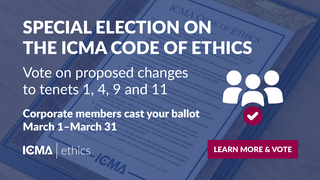
Members with voting privileges have the opportunity to vote yes or no on changes to Tenets 1, 4, 9, and 11.

They are more common, complex, and complicated than they appear to be.

Whatever comes next, lead with your values.

Ultimately, you are the only one responsible for your conduct.

Keeping local government staff and the organizations they represent above board when it comes to commerce and their relationship with vendors

The best approach to achieving an ethical outcome

Professional city and county managers must adhere to the spirit of the ICMA Code of Ethics and remain politically neutral in today’s hyper-politicized environment.

Understanding ICMA’s Ethics Enforcement Process

More tales from the field with advice on achieving ethical outcomes
